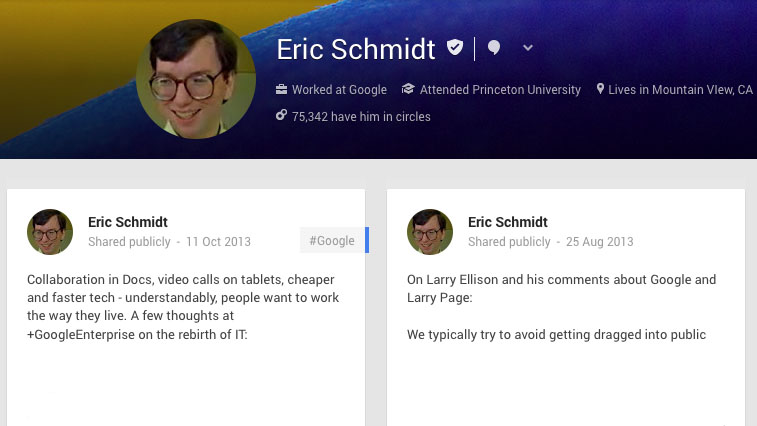Holy Schmidt! Why does Google now want to add our faces to ads?
Eric Schmidt's face declared unofficial mascot of civil unrest protest

From November 11, some changes to internet king Google's terms and conditions kick into effect, altering the permissions when it comes to reusing comments people have left across the Google network.
One of the key additions to the small print no one ever reads is the option to allow Google to use quotes and photos of users in advertising, meaning any positive comment you've previously made about a service, place or product via a Google site could be pulled out and served alongside your grinning face in your friends' search results.
Rather than welcoming this new opportunity to become digital advertising billboard superstars like David Beckham or that Wonderbra woman, the folks of the internet are not happy about Google's latest innovation in promotional activities.
The masses decided a clever way to protest this would be to adopt a photo of Google chairman Eric Schmidt as their Google+ profile pic, which could - but probably actually won't - result in Schmidt's face populating online ads for everything from tooth-whitening products to five-star cat kennels in New Hampshire.
Of course, you can opt out of it. But most people probably won't bother, and it's more fun to watch people get angry about it.
Giveth and taketh away
On the Independent, user MakeMPsOwnUp suggested Google ought to start embracing the dark side by counting -1 votes as well, asking: "Why isn't there a '-1' feature too. If people's endorsements are to be exploited so should their dislike."
He answered his own question with: "But in this vapid time we're not supposed to have anything other than positive sentiments toward products yet without the balance of -1 the +1s are of no value."
Sign up for breaking news, reviews, opinion, top tech deals, and more.
We have reported him to the negative opinion police and requested he be tagged as a possible internet troublemaker. He will now suffer random and inexplicable internet speed drops until he says something nice.
To answer the actual point about the inclusion of negative reviews, reader BerlinGooner responded with: "Google realises that businesses will be more reticent to get on board if they are exposed to potential negative ratings. It's all about money more than any honest transparency."
Looking on the Plus side
In terms of positive response to the move, we found one. Niall over on the Sophos security blog reckons it's an innocuous and possibly even useful move, saying: "I personally would have thought it was a good thing, with all the 'astroturing' (fake reviews) about I personally would find it helpful to see someone I know and therefore know is real has reviewed somewhere/thing."
Indeed, it seems most of the anger among users is the fact that it appears to be another method Google's using to force people to open and actively use a Google+ profile, with the search giant requiring its users to "upgrade" to a G+ account in order to deactivate the shared endorsements system and stop it pulling in reviews from other sites that live under the Google umbrella.
Plus interest
Over on Cnet, reader ShinyRoboto posted a long comment about how it's all about monetising your inane comments, saying: "Most of these entities are, at their core, nothing more than advertising engines (and may never be anything more... even with their forays into harder tech); if you use them, then you've probably vacated any rights to privacy, and they will monetize your information."
Alpha P was equally dismissive of the internet advertising boom, claiming: "It's just cyber-graffiti littering displays and bandwidth with advertisements. As someone else has mentioned - I never click an add unless by accident. One has never piqued my interest. They only annoy me. The more they annoy me, the darker the company's entry becomes in my virtual black book."
In fact, does anyone know anyone that's ever clicked on an advert on purpose? Is all of Google and the internet as a whole founded on accidental clicks by wobbly mouse hands?
Mr P continued his negative rant, with: "These people are shooting themselves in the foot. It's like population ecology where the parasites multiply to such an extent where eventually all the food is gone and they die. Well, at least we can only hope so." Very bleak, P, very bleak.
The madness of it all was summarised in a neat 24 words by Guardian reader Ladinbed, who asked: "Then what is the point in bothering to +1 something if you don't want people to know about it? Don't bother +1 ing things."
Most people have been not bothering to +1 things ever since Google+ arrived.